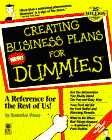Help Desk Books
Call Center
Management
Automation Aids
Online Support
Customer Satisfaction
Knock Your Socks
Off
Help Desk Institute
Telecom Books
Communication
Skills
Call Center Monitoring
Bargain Books (50% off!)
 |
Creating Business Plans for Dummies by Paul Tiffany and Steven Peterson, softcover, 384 pages, 1997, $21.99 |
Don't be fooled by the title - this hefty book on business planning is considered by many to be the best anywhere! Unlike the majority of business planning books that focus solely on the mathematics (cost, budgeting, ROI, etc.), authors Paul Tiffany and Steven Peterson go much further by walking you through the entire thought process: charting a course for the business, studying your marketplace, customer segmentation, scoping out the competition, forecasting and budgeting, where strategic thinking fits in, and how to make your buiness plan work. You'll be able to prepare a well-rounded, comprehensive, thoughtful business plan can get you that green light from upper management.
Contents
- Starting Your Business Plan
-
Charting the Proper Course
- Creating Your Company's Mission Statement
- Setting Your Own Goals and Objectives
-
Setting Off in the Right Direction
- Putting Together the Values Statement
- Creating Your Company's Vision Statement
-
Checking Out the Business Environment
- Defining the Business That You're In
- Analyzing Your Industry
- Markets
- Finance
- Recognizing Critical Success Factors
- Technology
-
Taking a Closer Look at Customers
- Checking Out Who Your Customers Are
-
Dividing Customers Into Groups
- Defining Market Segments
-
Scoping Out Your Competition
- Identifying Your Real Competitors
- Predicting Your Competitors' Moves
-
Establishing Your Starting Position
- Situation Analysis
- Identifying Strengths and Weaknesses
- Capabilities and Resources
- Financial Condition: Keeping Track of Money
- Completing Your SWOT Analysis
-
Focusing On What You Do Best
- Searching for Competitive Advantage
- Focusing on Core Competence
-
Figuring Out Financials
- Reading an Income Statement
- Revenue
- Costs
- Profit
- Evaluating Financial Ratios
-
Forecasting and Budgeting
- Constructing a Financial Forecast
- What-if Analysis
- How Budgets Are Done
-
Preparing for Change
- Economic Trends
- Technological Trends
- Trend Forecasting
-
Thinking Strategically
- Checking Out Strategic Alternatives
-
Managing More than One Product
- Finding Ways to Grow
- Making Your Business Plan Work
- A Sample Business Plan
-
Ten Questions to Ask About Your Plan
- Are Your Goals Tied to Your Mission?
- Can You Point to Major Opportunities?
- Have You Prepared for Threats?
- Have You Defined Your Customers?
- Can You Track Your Competitors?
- Do You Know Your Strengths and Weaknesses?
- Does Your Strategy Make Sense?
- Can You Stand Behind the Numbers?
- Are You Really Ready for Change?
- Is Your Plan Clear, Concise, and Up to Date?
-
Top Ten Business-Planning Never-Evers
- Failing to Plan in the First Place
- Shrugging Off Values and Vision
- Second-Guessing the Customer
- Underestimating Your Competition
- Ignoring Your Own Strengths
- Mistaking a Budget for a Plan
- Shying Away from Reasonable Risk
- Allowing One Person to Dominate the Plan
- Being Afraid to Change
- Forgetting to Motivate and Reward
- Ten of the Best-Planned Organizations Around